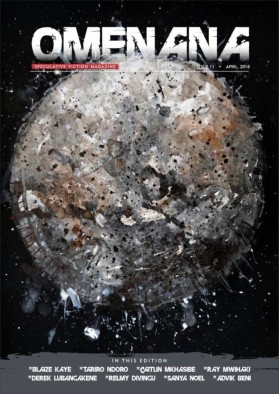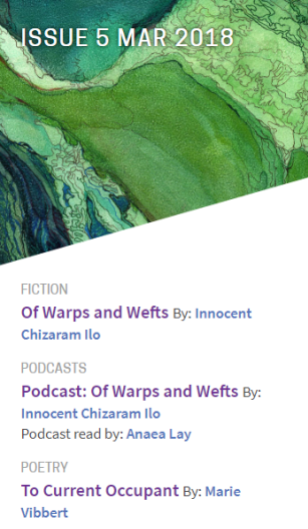
Hello Hello…
It’s almost deadline time for the Nommo Award nominations and I’ve been trying to catch up on my reading for stuff that came out last year and although I tried to read as much as I could, I couldn’t read everything. I still have a fairly long 2018 TBR list. Still, overall, from what I’ve seen, I think 2018 was a pretty good year for African Spec Fic. You can read Geoff Ryman’s broad summary of the year over at Locus magazine at THIS link. And if you want a working list of everything that came out last year, check out THIS link.
As has become usual, I like to highlight short stories which I did manage to read and which I enjoyed most from the year, mostly to thank the authors for producing work that I appreciated and also to help spread the word.
Note: I am working with the ASFS definition of Short Story, which includes stories of up to 17500 words (which may be classed as novelettes in other some other categorizations)
Let’s just jump right into it shall we?
- “Origami Angels” by Derek Lubangakene (Uganda), Omenana
This is a great story about youth, friendship and superpowers. It also has a killer opening line. In it, Duncan and Asaf are schoolmates, one of whom may actually have superpowers, who dedicate themselves to beating a schoolmate at origami. Eventually the origami comes to represent much more, a striving for something greater despite tragedy. Recommended.

- “Of Warps and Wefts” Innocent Chizaram Ilo (Nigeria), Strange Horizons and “Murders Fell from Our Wombs” Tlotlo Tsamaase (Botswana), Apex Magazine
OK I’m cheating a little it with this one by making it a tie (I can’t promise I wont do it again) but it seems best to do it that way for me because I feel they have a lot of the same strengths (and weaknesses). They are both metaphorical fantasy stories with very interesting takes on society and gender but also stories where I feel, the idea, the central conceit was more interesting than the actual story. Still, the ideas behind both stories and the writing styles chosen are so interesting and unusual and just plain bizarre even if they are both a bit confusing that I largely enjoyed them and I’m happy to recommend them.
- “Mother of Invention” by Nnedi Okorafor (Nigeria/USA), Slate Magazine
This is a nice science fiction story that takes the idea of smart homes, plants it firmly in Nigeria, and then extrapolates it into the future. In the story, a pregnant woman named Anwuli whose lover, the father of her child and architect of her home turns out to be married, must give birth alone in the middle of a storm surrounded by deadly pollen from genetically modified plants with only the help of her smart home – Obi 3.

I enjoyed this story for its interesting scientific speculation, Anwuli’s character and the clever portrayal of the home. Recommended.
- “Dreaming Monsters” by Cat Hellisen (South Africa), Learning How to Drown
Cat Hellisen’s spectacular short story collection “Learning To Drown” seems to contain 3 new stories original to the collection, all of which are very strong and embody her typical style: poetic, vivid and grounded writing with strong themes, like fairy tales for adults.

It wasn’t easy picking a favorite, I love every story of hers that I’ve read, but Dreaming Monsters stayed the longest with me after I read it. Set in a world concurrent to ours, it follows a young girl who accompanies her grandmother into the dreaming, cross worlds via dreams to collect items for trade, with all the adventure, tragedy and growth that follows. It’s an amazing story that stands out in an amazing collection and I highly recommend it.
- “The Witching Hour” by Ekpeki Oghenechovwe Donald (Nigeria), Cosmic Roots and Eldritch Shores and Obibi by Dilman Dila (Uganda), A World of Horror.
Oh look. Another tie. But here, as before, I do have a good reason for recommending them together because I enjoyed them for similar reasons. These are both horror-fantasy stories about difficult balances and compromise in which characters viewed in their own societies as evil (I one case a witch and in the other a monster), come to face extreme versions of the evil that they could have become if they’d lacked positive and compassionate figures in their lives. Both stories are elegantly structured and well-paced, building up to the final confrontations smoothly to their conclusions. Recommended.
- “In Her Bones” by Lindiwe Rooney (South Africa), The Dark

This is a powerful, tense, and dark fantasy in which Ayanda, a young woman whose father works for the local crime lord, finds herself put in an impossible situation by the crime lord’s son and chooses to defend herself even though that action means she must pay great price, both physically and spiritually but still, finds a kind of hope somehow, with the support of ancient spirits. I completely enjoyed the world building and the character here. Highly Recommended.
- “Black and Gold” by Mame Bougouma Diene (Senegal/France/USA), Dark Moons Rising on a Starless Night

Diene’s collection is a curious thing. I like the first story “Fistulas”, which I first came across and edited three years ago for the Lights Out: Resurrection anthology. I thought it was a good story, even if it was a bit structurally weak then and I am glad to see it leaner and improved in this version, even if the themes are still a bit muddled. The second story “The Whores, The Dealer and The Diamond”, was confusing and hard to read and perhaps was aiming to do something I just couldn’t see. But the final two stories, “Popobawa” and “Black and Gold” are both excellent, using multiple character perspectives, shifting in time, and using dream sequences to create truly unsettling stories. It was hard to choose between these two but “Black and Gold”, about a bizarre sort of revolutionary movement in Senegal, whose leader, Leuk Daour Mbaye, is possessed by the spirit of a white horse, just edges out for me personally. Mbaye uses his powers to isolate Senegal from the world, control his followers, destroy foreign oil rigs, end corruption, and more. The story comments on the deep links between the past, present and future and how well-meaning revolutions can easily be co-opted into something worse, much worse. I really recommend it (and “Popobawa” too).
- “Memento Mori” by Tiah Marie Beautement (South Africa), Omenana

Who would have thought that a story about a friendship between a boss and an employee could be so tender, especially one where the boss is the personification of Death and the employee is a woman with a disability (hypermotility of the joints caused by Ehlers-Danlos Syndrome). In the story, she works primarily in water, searching out souls that have become detached from their bodies and now float in water, even though they aren’t yet dead. By so doing, she helps them find a kind of peace. The best part of the story is the intimate relationship she has with Death, who cares for her, respects her but doesn’t condescend and isn’t cold to her. While she in turn, helps him independently and skillfully despite the pain. There is just so much kindness and tenderness in the story that its almost impossible not to be moved by it.
- “The Luminal Frontier” by Biram Mboob (Gambia/UK), AfroSFv3
While I do have a story of my own in AfroSfv3, there are so many other great stories as well and I have many personal favorites but if I was forced to pick one as the favorite, I’d take Biram Mboob’s ambitious and lovely story, “The Luminal Frontier”.

This is a great, imaginative science fiction story that begins with an interstellar shipping crime and circles all the way back to a choice on that ship touching on multiple selves, artificial intelligence, and time travel. I also think it works on some level as a metaphor for history and the writing is lovely. Highly Recommended.
- “Brand New Ways (To Lose You Over And Over And Over Again)” by Blaize Kaye (South Africa), Omenana

Blaize Kaye is a man after my own heart. He consistently writes the kind of science fiction I particularly enjoy with far more heart than I could. This story is another amazingly crafted example. It’s a story of love and loss filtered through a science fiction lens that just as much a bullet to the heart as his earlier 2016 effort “Ndakusawa”. In this story, a couple, one of whom has a terminal illness have chosen to give up their bodies and have their consciousnesses uploaded to virtual space, where they have to work to cover the cost of the upload procedure, but where, at least, they can still be together. But once uploaded, they find themselves facing another kind of problem in virtual space with which they try and try again to cope. Clever and Powerful. Highly Recommended.
***
So… those were my favorites (and likely nominees for the Nommos).
What were yours? Any great African SFF stories you’d recommend?




Nice list
LikeLike
Reblogged this on Pen Nation.
LikeLike